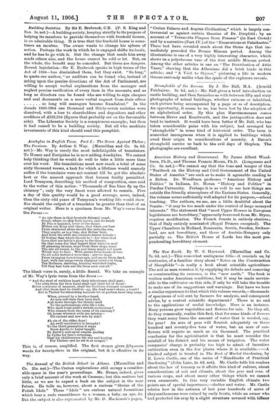Aeschylus in English Verse. Part I.: The Seven Against Thebes
; The Persians. By Arthur S. Way. (Macmillan and Co. 3s. 6d. net.)—Mr. Way is surely the most indefatigable of translators. To Homer and Euripides he is now adding Aeschylus. We cannot help thinking that he would do well to take a little more time over his work. His translations must now reach a total of some sixty thousand verses, a task for which a lifetime would scarcely suffice if the translator were not content till he got the absolute best or the, nearest approach that human frailty permitted. Lord Tennyson, describing his method of composition, once said to the writer of this notice : "Thousands of fine lines fly up the chimney"; only the very finest were allowed to remain. Five a day of this quality would be a good average, more, indeed, than the sixty odd years of Tennyson's working life would show. Nor should the output of a translator be greater than that of an original writer. Here is a specimen from Mr. Way's verse from the Persae :— " An isle there is that fronteth Salamis' coast, Small, where no ship finds haven, and its beach
By Fan is haunted, lover of the dance.
Hither our King sent these, that when our foes
From shattered ships should flee unto the isle,
They might, as in a trap, slay Hellas' host, And from the swift sea-currents rescue friends—
Ill boding that which should be !—for when God Gave that sea-battle's glory to the Greeks, On that same day they lapped their limbs in mail Of gleaming bronze, leapt from their ships, beset The isle all round, to the end these might not know Which way to face. With stones from hands of foes On all sides battered were they : arrows leapt From twanging bowstrings aye, and smote them dead.
Last, with one surge-sweep charging burst o'er them The Hellenes, stabbing, hacking wretched limbs, Till they had torn out life from each and all."
The blank verse is, surely, a little flaccid. We take an example of Mr. Way's lyric verse from the Seven :— "And the steel of ruthless heart their inheritance shall part ;
The alien from the Iron Land shall cast their lot of doom : Bitter portioner of measure, shall the Scythian stranger measure And allot them land to dwell in—ay, the dead man's share, a tomb!
But in Thebes' far-stretching lealands lot or portion have they none.
When, pierced by a brother-hand, As men self-slain they have died, And down through the thirsty sand
To the nethergloom ebbs life's tide,
Who shall loose guilt's fetters enchaining ?
Who cleanse from the curse of its staining ?
Oh house whereon evils are raining—
Ills ancient and new side by side
Ah sin of the olden days
Ah swift retribution it brought !
To the third generation it stays Since Apollo to Laing taught, By Barth's mid.navel oracles pealing In Fytho for fate's revealing,
That his childlessness life was and healing
For Thebes—yet he set it at nought."
This is, of course, amplified. The first stanza gives fifty-seven words for twenty-three in the original, but it is effective in its way.


































 Previous page
Previous page